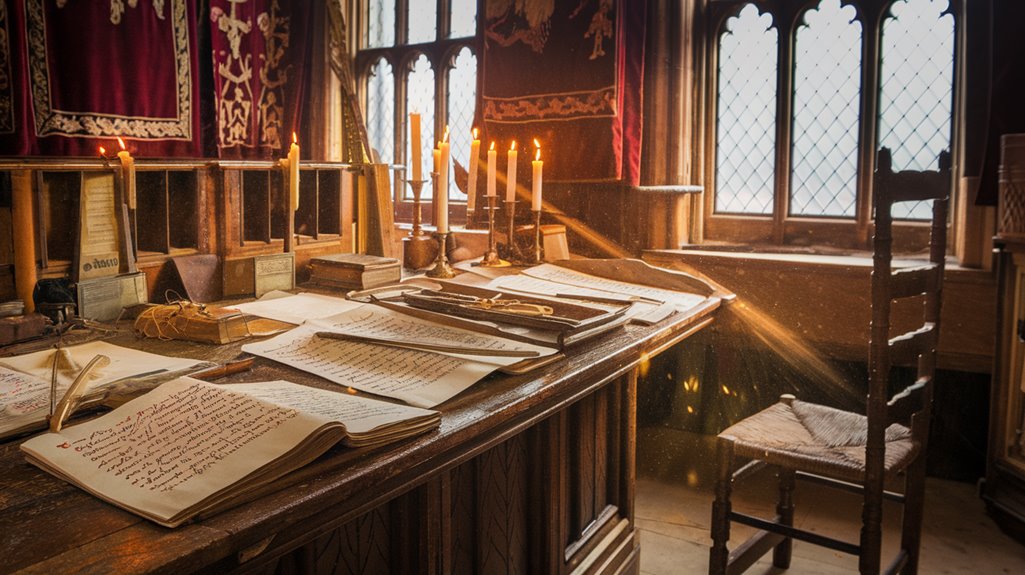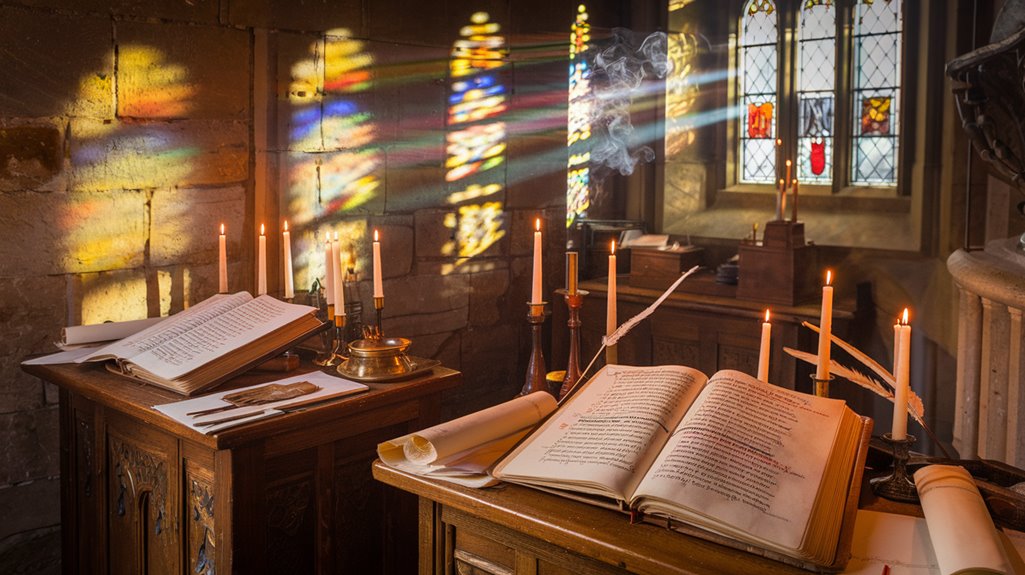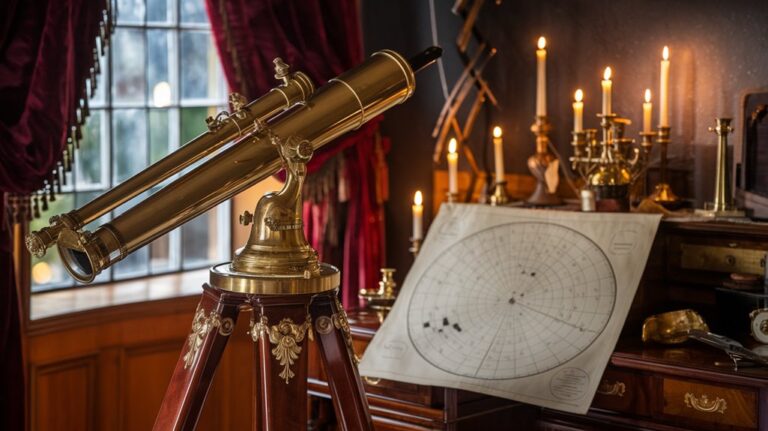How Far Back Could You Time Travel and Still Speak English?
Have you ever wondered what would happen if you stepped through a time portal and tried to order a meal in medieval England? You'd quickly discover that traveling too far back would leave you struggling to communicate in what's supposedly your own language. While you might manage a basic conversation in Shakespeare's time, anything before 1500 would sound more like a foreign tongue. Let's explore just how far back you could venture before English becomes completely alien to your modern ears.
The Time Traveler's Guide to English Through the Ages
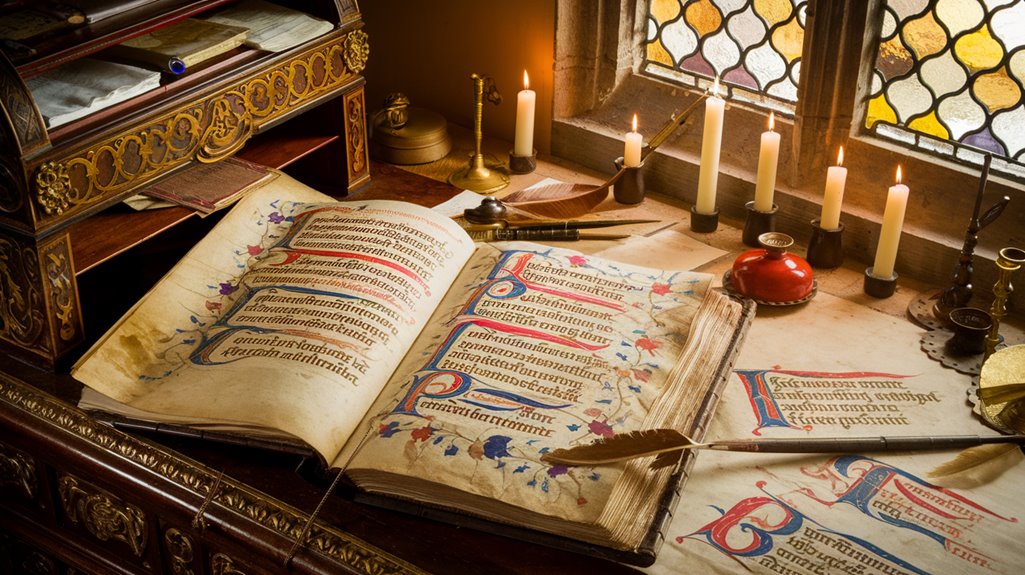
When would you be able to converse with English speakers throughout history? You'd find it relatively easy to communicate with people from the 16th century onward, thanks to the standardization of English and the completion of major language shifts like the Great Vowel Shift.
Before that, you'd face increasing challenges the further back you travel. If you ventured to the Early Middle English period after 1066, you'd encounter significant dialect diversity and heavy French influence that would make communication difficult. In fact, after William the Conqueror's invasion, there was a clear linguistic class division where French became the language of nobility while English remained among the lower classes. Around this time, spaces between words were just beginning to be introduced, making written texts especially challenging to decipher.
The lack of standardized spelling and pronunciation would complicate matters further. Your best strategy would be to speak slowly and deliberately, focusing on basic vocabulary.
Written communication might help, but you'd need to master earlier spelling conventions and vocabulary differences to make yourself understood.
Understanding Old English: Could You Survive in Anglo-Saxon Britain?
If you traveled back to Anglo-Saxon Britain, you'd quickly discover that Old English bears little resemblance to our modern tongue. You'd need to master a complex system of grammatical cases, gender-specific nouns, and verb conjugations that have long since disappeared from English.
Even simple conversations would prove challenging, as Old English uses different word orders and lacks many familiar features of modern English, like do-support in questions. The language emerged when Germanic tribes settled in Britain after the Romans departed. Approximately 85 percent of words used during the Old English period are no longer in use today.
Your social status would greatly impact your survival. As a time traveler, you'd likely find yourself among the churls, living in simple wooden huts and working the land.
Unless you could prove yourself valuable to a thane, you'd spend your days farming, sharing living quarters with animals, and surviving on a basic diet of bread and cheese.
The Norman Impact: Navigating Middle English Communication
Following the Norman Conquest of 1066, you'd encounter a radically different linguistic landscape than Anglo-Saxon Britain. As Norman French merged with Old English, you'd find yourself maneuvering through the complex world of Middle English, where communication varied dramatically across regions and social classes.
If you were to interact with the nobility, you'd need to understand French, as it dominated court life and administration. The Norman conquest led to only two Anglo-Saxons retaining their positions of power and land ownership twenty years after the Battle of Hastings.
Meanwhile, conversations with common folk would require familiarity with their evolving English dialects. The linguistic diversity of this period would pose significant challenges, especially during the Great Vowel Shift, when pronunciation underwent massive changes. The Chancery English standard established by clerks fluent in French helped create consistency in official documents during this period.
Even if you could read and write Middle English, understanding spoken language would prove difficult, as accents and dialects differed substantially between regions and social groups.
Shakespeare's Era: Your Best Bet for Time Travel
The late 16th century emerges as your ideal destination for English time travel, particularly during Shakespeare's era.
You'll find yourself in London during a pivotal time when the English language was becoming standardized, making communication surprisingly manageable. While Elizabethan slang might throw you off initially, you'd grasp the general meaning of conversations thanks to the completed Great Vowel Shift. The emergence of a court and theater language helped establish common speech patterns throughout London. With Shakespeare's vast educated vocabulary, you'd encounter a rich linguistic landscape unmatched by his contemporaries.
Shakespeare's England offers a sweet spot where grammar rules were flexible, and creativity flourished.
You might stumble over some unconventional plurals like "housen" or peculiar tense usage, but you'd catch on quickly. Even Shakespearean puns would make sense once you adapt to the wordplay.
The biggest hurdle wouldn't be the language itself, but rather maneuvering the cultural norms of the time.
Language Evolution: Why Modern English Speakers Would Struggle in the Past
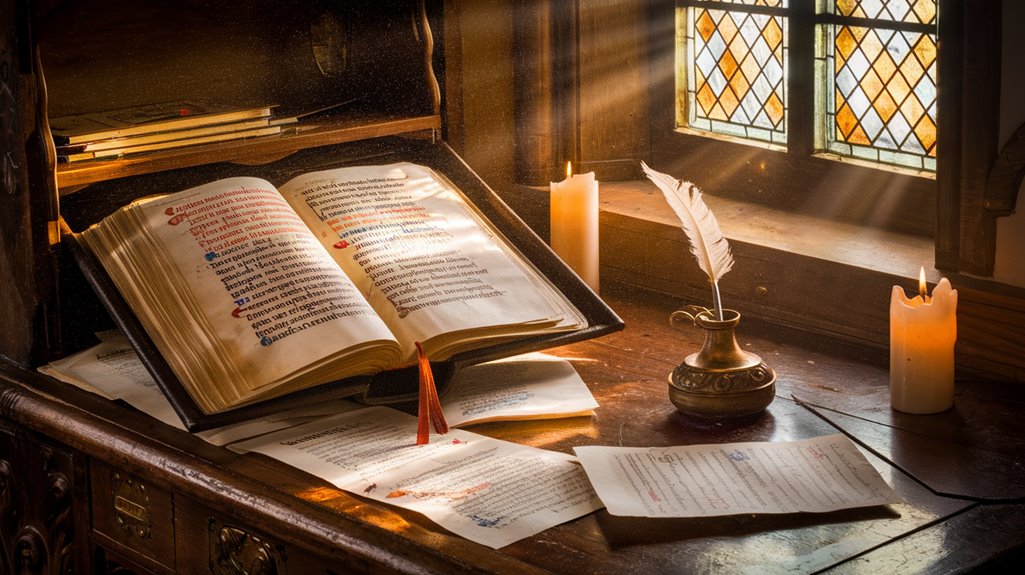
Modern English speakers venturing beyond Shakespeare's era would face increasingly insurmountable language barriers.
You'd encounter significant communication barriers with Old English speakers, as their vocabulary differences stemmed from Germanic roots and Celtic influences, with far fewer words at their disposal. Old English had four main dialects, including Mercian, Northumbrian, Kentish, and West Saxon, making communication even more complex.
Pronunciation challenges would be particularly intimidating due to the Great Vowel Shift. Words you know today, like "meet," would have sounded completely different, closer to "mate." Going back to the mid 16th century would be the furthest point where modern English speakers could reasonably understand the language.
Dialect diversity would further complicate matters, as regional variations were more pronounced and often mutually unintelligible. Even in Middle English, after the Norman Conquest introduced French influences, you'd struggle to understand local speech patterns.
Cultural context would also pose problems, as many words carried different meanings or referenced concepts unfamiliar to modern speakers.

